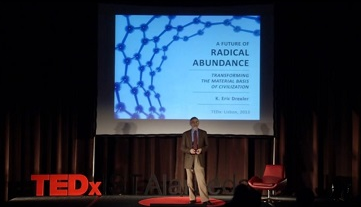The Once & Future Nano King*
K. Eric Drexler is back...and with a new set of bold ideas about the technological future, all detailed in his new book, Radical Abundance.  But there's a twist! The man once christened by magazines like The Economist as the "father" of nanotechnology is imagining possible tomorrows made better without the n-word. More on this semantic shift below. But first - whatever happened to him in the first place?Drexler's story resembles those of once-prominent Communist Party members who fell into disfavor, vanished for a period and then, after some political rehabilitation, emerged back on the public stage.In brief - Drexler first became interested in what he initially called "molecular engineering" in the late 1970s. A 1981 paper published in the Proceedings of the National Academy of Sciences laid out his general plan for "molecular manipulation." (The word “nanotechnology” appeared nowhere in the manuscript. In fact, it would still be a few more years before Drexler began using the nano-word in talks and papers.) This was based, he predicted, on the design on de novo protein-based machines which would be able to move and position other molecules so as to build up structures and devices atom-by-atom. A 1986 book called Engines of Creation popularized Drexler's ideas and the concept of nanotechnology to a wide audience. Tech enthusiasts, business leaders, mainstream scientists, and policy makers took note.
But there's a twist! The man once christened by magazines like The Economist as the "father" of nanotechnology is imagining possible tomorrows made better without the n-word. More on this semantic shift below. But first - whatever happened to him in the first place?Drexler's story resembles those of once-prominent Communist Party members who fell into disfavor, vanished for a period and then, after some political rehabilitation, emerged back on the public stage.In brief - Drexler first became interested in what he initially called "molecular engineering" in the late 1970s. A 1981 paper published in the Proceedings of the National Academy of Sciences laid out his general plan for "molecular manipulation." (The word “nanotechnology” appeared nowhere in the manuscript. In fact, it would still be a few more years before Drexler began using the nano-word in talks and papers.) This was based, he predicted, on the design on de novo protein-based machines which would be able to move and position other molecules so as to build up structures and devices atom-by-atom. A 1986 book called Engines of Creation popularized Drexler's ideas and the concept of nanotechnology to a wide audience. Tech enthusiasts, business leaders, mainstream scientists, and policy makers took note. In Engines and other writings, Drexler took pains to describe his work not as scientific research but as "exploratory engineering" - designing things today that obey the laws of physics, chemistry, etc. yet which we can't build yet. Konstantin Tsiolkovskii and other early space (as well as computer) pioneers worked in a similar fashion.When it came to nanotechnology, Drexler literally defined it with his entry in Encyclopedia Brittanica’s Yearbook of Science and the Future 1990. Throughout much of the 1990s, when journalists and the general public considered nanotechnology, it was shot through of Drexlerian ideas (the nanobot meme, something Drexler himself eschewed, is a classic example of how some of his own imaginings were co-opted and adopted by others). Given the emerging differences between Drexler’s supporters and those in the mainstream research community who found his ideas too fanciful – a rift which widened into a chasm over the next decade – one senses that Drexler’s visioneering was succeeding perhaps too well. In the late 1990s and into the early 21st century, mainstream scientists gradually marginalized Drexler (my book The Visioneers describes all of this in great detail) and his ideas.So, in 2003, when former president George W. Bush signed the 21st Century Nanotechnology Research and Development Act, there were a number of people standing behind him in the Oval Office. We see a Silicon Valley venture capitalist, a nano-business advocate, a Republican senator, a Nobel prize winning scientist. But Drexler was nowhere in sight.
In Engines and other writings, Drexler took pains to describe his work not as scientific research but as "exploratory engineering" - designing things today that obey the laws of physics, chemistry, etc. yet which we can't build yet. Konstantin Tsiolkovskii and other early space (as well as computer) pioneers worked in a similar fashion.When it came to nanotechnology, Drexler literally defined it with his entry in Encyclopedia Brittanica’s Yearbook of Science and the Future 1990. Throughout much of the 1990s, when journalists and the general public considered nanotechnology, it was shot through of Drexlerian ideas (the nanobot meme, something Drexler himself eschewed, is a classic example of how some of his own imaginings were co-opted and adopted by others). Given the emerging differences between Drexler’s supporters and those in the mainstream research community who found his ideas too fanciful – a rift which widened into a chasm over the next decade – one senses that Drexler’s visioneering was succeeding perhaps too well. In the late 1990s and into the early 21st century, mainstream scientists gradually marginalized Drexler (my book The Visioneers describes all of this in great detail) and his ideas.So, in 2003, when former president George W. Bush signed the 21st Century Nanotechnology Research and Development Act, there were a number of people standing behind him in the Oval Office. We see a Silicon Valley venture capitalist, a nano-business advocate, a Republican senator, a Nobel prize winning scientist. But Drexler was nowhere in sight. And the bill Bush signed bore scant resemblance to the type of nanotechnology Drexler had long promoted. In fact, by the time the National Nanotechnology Initiative was proceeding full-bore, Drexler was “the name that can’t be spoken in polite society,” or at least among many mainstream scientists and policy makers. ((2006 remark by physicist Richard A.L. Jones, quoted in Arie Rip and Marloes Van Ameron, “Emerging De Facto Agendas Surrounding Nanotechnology: Two Cases Full of Contingencies, Lock-Outs, and Lock-Ins,” in Governing Future Technologies, edited by Mario Kaiser, et al. (New York: Springer, 2010), 131-55.))But that is changing. Since 2011, Drexler has been in residence at the University of Oxford. He is currently listed as an "Academic Visitor" in the Oxford Martin Programme on the Impacts of Future Technology. (A video of him giving an address there is here...it's worth watching if you have the time.) Drexler's move to the U.K. is part of this rehabilitation. What could be more Establishment than Oxford? It also fits his overall career pattern of finding affiliations with elite schools (MIT, Stanford) while avoiding the traditional professorial career path. Drexler also has been giving more public talks and writing pieces for the mainstream press such as essays for The Guardian. Accompanying this are appearances at venues like TEDx, signs that Drexler is placing himself back in the role as a technology intellectual and public figure.
And the bill Bush signed bore scant resemblance to the type of nanotechnology Drexler had long promoted. In fact, by the time the National Nanotechnology Initiative was proceeding full-bore, Drexler was “the name that can’t be spoken in polite society,” or at least among many mainstream scientists and policy makers. ((2006 remark by physicist Richard A.L. Jones, quoted in Arie Rip and Marloes Van Ameron, “Emerging De Facto Agendas Surrounding Nanotechnology: Two Cases Full of Contingencies, Lock-Outs, and Lock-Ins,” in Governing Future Technologies, edited by Mario Kaiser, et al. (New York: Springer, 2010), 131-55.))But that is changing. Since 2011, Drexler has been in residence at the University of Oxford. He is currently listed as an "Academic Visitor" in the Oxford Martin Programme on the Impacts of Future Technology. (A video of him giving an address there is here...it's worth watching if you have the time.) Drexler's move to the U.K. is part of this rehabilitation. What could be more Establishment than Oxford? It also fits his overall career pattern of finding affiliations with elite schools (MIT, Stanford) while avoiding the traditional professorial career path. Drexler also has been giving more public talks and writing pieces for the mainstream press such as essays for The Guardian. Accompanying this are appearances at venues like TEDx, signs that Drexler is placing himself back in the role as a technology intellectual and public figure. But the signature event of Drexler's rehabilitation back into public life (if not into the mainstream of scientific or engineering research) is the 2013 publication of his new book. In the same spirit as Engines, Radical Abundance is aimed at a popular audience. It's much different from his highly technical 1992 tome Nanosystems, for example.I'll be saying more about the book itself in a later post. But without giving too much away, Radical Abundance is Drexler's pivot away from nanotechnology. In his telling, that word has become much too politicized (thanks, in no small part, to his own writings) and vaguely applied. I mean, what exactly IS nanotechnology anyway? Is it passive nanoscale particles? Active nanoscale devices? A novel approach to building new materials? Or a massive government-run program? Well, it's all of these and more. I tend to agree with Richard Jones' interpretation and see nanotechnology more as a sociological phenomenon, a way of organizing and bridging research across disparate scientific fields. (The same can be said for the Obama administration's current attempts to fashion a neuroscience initiative around brain mapping.) ((A recent article in Nature about the BRAIN initiative described recent efforts as "a large-scale sociological experiment, as the sprawling neuroscience community struggles to coalesce around a common research plan under intense public scrutiny and tough financial constraints."))So, in Radical Abundance, Drexler has done away with nanotechnology and replaced it with --- wait for it --- "atomically precise manufacturing" (APM). This means two things in his telling - "manufacturing using machinery based on nanoscale devices" and "products built with atomic precision." ((Radical Abundance, x.)) Drexler's new term is, well, much more precise.
But the signature event of Drexler's rehabilitation back into public life (if not into the mainstream of scientific or engineering research) is the 2013 publication of his new book. In the same spirit as Engines, Radical Abundance is aimed at a popular audience. It's much different from his highly technical 1992 tome Nanosystems, for example.I'll be saying more about the book itself in a later post. But without giving too much away, Radical Abundance is Drexler's pivot away from nanotechnology. In his telling, that word has become much too politicized (thanks, in no small part, to his own writings) and vaguely applied. I mean, what exactly IS nanotechnology anyway? Is it passive nanoscale particles? Active nanoscale devices? A novel approach to building new materials? Or a massive government-run program? Well, it's all of these and more. I tend to agree with Richard Jones' interpretation and see nanotechnology more as a sociological phenomenon, a way of organizing and bridging research across disparate scientific fields. (The same can be said for the Obama administration's current attempts to fashion a neuroscience initiative around brain mapping.) ((A recent article in Nature about the BRAIN initiative described recent efforts as "a large-scale sociological experiment, as the sprawling neuroscience community struggles to coalesce around a common research plan under intense public scrutiny and tough financial constraints."))So, in Radical Abundance, Drexler has done away with nanotechnology and replaced it with --- wait for it --- "atomically precise manufacturing" (APM). This means two things in his telling - "manufacturing using machinery based on nanoscale devices" and "products built with atomic precision." ((Radical Abundance, x.)) Drexler's new term is, well, much more precise. It's about building things, not researching, for instance, the toxicological effects on nanoparticles on fish. And "manufacturing" connotes industry which suggests jobs. This is a good strategy. But, at its core, APM harkens back to his earlier program of building things atom by atom. APM invokes a world in which mechanical engineering combines with chemistry. And, just as in Engines, Radical Abundance offers plenty of examples of how APM offers promise and peril if adopted (which Drexler sees as pretty much inevitable).I'm looking forward to reading Radical Abundance more closely. I'm very intrigued by the first skim I've made, especially those sections in which Drexler offers his view of the history of nanotechnology (and his removal from "official" narratives of same). The demarcation Drexler is trying to make between nanotechnology (old, confused) and "atomically precise manufacturing" (new, specific) is fascinating just as are Drexler's borders between science and engineering.
It's about building things, not researching, for instance, the toxicological effects on nanoparticles on fish. And "manufacturing" connotes industry which suggests jobs. This is a good strategy. But, at its core, APM harkens back to his earlier program of building things atom by atom. APM invokes a world in which mechanical engineering combines with chemistry. And, just as in Engines, Radical Abundance offers plenty of examples of how APM offers promise and peril if adopted (which Drexler sees as pretty much inevitable).I'm looking forward to reading Radical Abundance more closely. I'm very intrigued by the first skim I've made, especially those sections in which Drexler offers his view of the history of nanotechnology (and his removal from "official" narratives of same). The demarcation Drexler is trying to make between nanotechnology (old, confused) and "atomically precise manufacturing" (new, specific) is fascinating just as are Drexler's borders between science and engineering. But what intrigues me most is the larger process of rehabilitation that I see taking place. We see attempts to do this quite frequently on the part of celebrities, musicians, and politicians. Sometimes this is done to craft a new public image (like the Rolling Stones going disco) or to try to atone for past sins (Newt Gingrich, ad infinitum). How common is this among scientists or technologists?Sometimes such attempts at reinvention work. But many times - often? - those attempting such feats end up singing the same songs and sinning as before.---* The joke here - probably not a good one - is that Drexler was also once part of a commercial venture called NanoRex.
But what intrigues me most is the larger process of rehabilitation that I see taking place. We see attempts to do this quite frequently on the part of celebrities, musicians, and politicians. Sometimes this is done to craft a new public image (like the Rolling Stones going disco) or to try to atone for past sins (Newt Gingrich, ad infinitum). How common is this among scientists or technologists?Sometimes such attempts at reinvention work. But many times - often? - those attempting such feats end up singing the same songs and sinning as before.---* The joke here - probably not a good one - is that Drexler was also once part of a commercial venture called NanoRex.